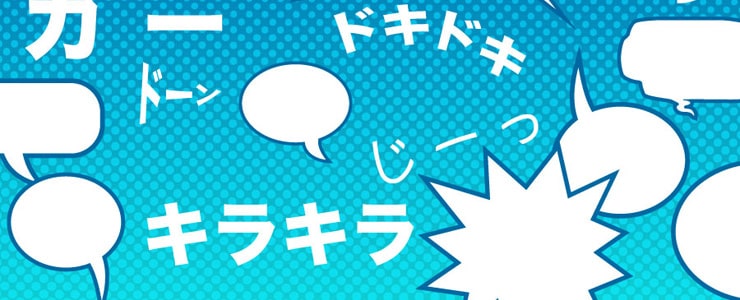
Ehab Ahmed Ebeid is an Instructor at the Arabic Islamic Institute in Tokyo. He published the following article in which he explains why Japanese onomatopoeia is one of the most intriguing features of the Japanese language. Excel Translations does not endorse, recommend, or make representations with respect to the following content.
A well-cleaned floor shines pika pika, while a light, fluffy futon is fuwa fuwa. Japanese onomatopoeia is one of the language’s most intriguing features, with many linguistic discoveries to be made.
Sounds and States
“Stop lazing about [goro goro] and look after the kids!” “Don’t chat idly [dara dara] on the phone!” “Don’t just hang around [uro uro] doing nothing!” Each time I hear my wife talk like this, I get nervous (biku biku). Japanese onomatopoeia is richly expressive for describing the nuances of many different situations.
It includes giongo, which are words used to represent sounds, such as animal noises. Gitaigo, on the other hand, are used to represent particular states, and the Japanese language is notable for its abundance of such words. For fluent Japanese speakers, it is perfectly natural to use them regularly. While all of the world’s languages feature onomatopoeia, they vary greatly in the sounds they use.
Examples of Japanese Onomatopoeia
Ira ira
Derives from the word ira, meaning “thorn.” Used to indicate a displeased or irritable feeling.
Example:
試験勉強が思うように進まずイライラする。
Shiken benkyō ga omou yō ni susumazu ira ira suru.
I’m annoyed because my exam study isn’t going as well as I thought it would.
Pika pika
Shiny, glittering.
Example:
靴をピカピカに磨いて会社に行く。
Kutsu o pika pika ni migaite kaisha ni iku.
I polish my shoes until they’re gleaming before going to work.
Waku waku
Derives from the verb waku to describe water “gushing” out of the ground. Indicates excitement due to anticipation or happiness.
Example:
彼女が留学を終え、帰ってくる。ワクワクしながら空港に迎えに行った。
Kanojo ga ryūgaku o oe, kaette kuru. Waku waku shinagara kūkō ni mukae ni itta.
My girlfriend was on her way back from studying abroad. I was excited as I went to meet her at the airport.
Fuwa fuwa
Light and fluffy. Also used to describe this kind of object floating through the air.
Example:
青空に白い雲がふわふわ浮いている。
Aozora ni shiroi kumo ga fuwa fuwa uiteiru.
White, fluffy clouds are floating in the blue sky.
Mochi mochi
The soft, sticky texture of some foods; soft and supple (of skin).
Example:
赤ちゃんのもちもちした肌がうらやましい。
Akachan no mochi mochi shita hada ga urayamashii.
I’m jealous of babies’ soft and supple skin.
Niko niko
Smiling cheerfully.
Example:
何かいいことがあったのか、きょうの上司は終始ニコニコ顔だ。
Nani ka ii koto ga atta no ka, kyō no jōshi wa shūshi niko niko gao da.
Something nice must have happened to my boss; she’s been beaming all day.
Peko peko
To be hungry; to be servile. Said to be an adapted form of the verb hekomu, “to become hollow.”
Examples:
お腹がぺこぺこで集中できない。
Onaka ga peko peko de shūchū dekinai.
I’m starving, so I can’t concentrate.
社長にペコペコする。
Shachō ni peko peko suru.
To suck up to the company president.
Doki doki
The rapid heartbeat caused by happiness, unease, fear, or surprise.
Example:
試験結果発表の日、不安で心臓がドキドキした。
Shiken kekka happyō no hi, fuan de shinzō ga doki doki shita.
The day the exam results were published, my heart was beating so hard from nerves.
Pera pera
To speak fluently, particularly a foreign language.
Example:
彼は英語がペラペラだ。
Kare wa eigo ga pera pera da.
He is fluent in English.
Leave a Reply